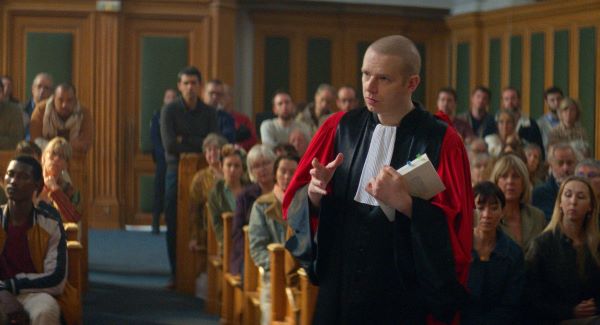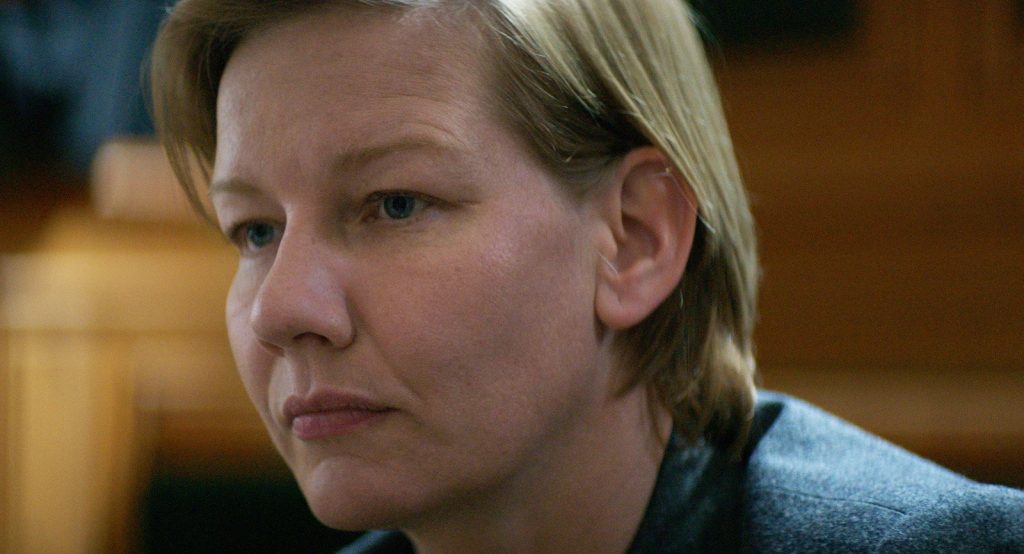This thriller film, mostly spoken in English, is about a writer trying to prove her innocence in a court of law after her husband was found dead in the snow outside her house. She is charged with his murder.
ANATOMY OF A FALL. Starring: Sandra Hüller, Milo Machado-Graner, and Samuel Theis. Also Swann Arlaud and Antoine Reinartz. Directed by Justine Triet. Rated MA15+. Restricted. (Strong themes, suicide reference and violence). 152 Min.
Review by Peter Sheehan, Jesuit Media Australia
This is a French production film directed by Justine Triet from a screenplay co-written with Arthur Harari. The film won the prestigious Palme d’Or at the 76th. Cannes Film Festival in 2023. It also won the Audience Award for Best International Narrative Feature film at the Sydney Film Festival in 2023, and received the Golden Globes Award for Best Foreign Language Film of 2023.

Sandra Voyter (Sandra Huller), an acclaimed German novelist, is the mother of an 11-year old, partially blind son, Daniel (Milo Machado-Graner), and she is unhappily married to her French husband, Samuel (Samuel Theis). Daniel returns to his parents’ secluded chalet in the French Alps after walking his dog, and reports to his mother that Samuel is lying dead in the driveway of the house, apparently having fallen from a great height. An autopsy showed that Samuel had a serious head wound, that was inflicted before, not after, his body hit the ground. Daniel, the sole witness, is disturbed by what has transpired, and agrees to testify, but he does not want what he will say in court to be shared beforehand with his mother or anyone else.
The film is a taut, tense, psychological, legal drama. Samuel was responsible for the accident that blinded Daniel, and both Daniel and Samuel were depressed about what has happened. In court, Sandra admits to violence occurring in arguments between herself and her husband, but claims that injury often resulted from Samuel inflicting pain on himself. Daniel’s father felt guilty about the accident that blinded his son, and mutual infidelity has characterised his marriage to Sandra. Daniel tells the court about a fight his father and mother had on the day before he died, and what he thinks has happened. Sandra has also dishonestly used one of her husband’s plot-lines in her own book, but attests vehemently in court that Samuel knew about that, but she did not kill him. The film plays ingeniously and brilliantly with two scenarios: Did Sandra murder Samuel, or did he take his own life? In court, Sandra cites Samuel’s guilt and his failure as a writer as reasons for his possible suicide, and the task of “The Law” is to try to make sense of all that has taken place.


This film is no ordinary who-done-it, but a gripping emotional movie about tragic events in a failed marriage and its plot is anchored cleverly to family turmoil. Sandra has lied, but is she is now lying about something else? Samuel was guilty about Daniel, but did guilt, insecurity, and marital anguish result in his suicide? The film responds to these questions, after keeping viewers guessing all the way. No self-respecting reviewer would wish to spoil the movie’s attempts to explain.
This is an excellent movie that is stunningly directed, acted, and scripted, and the film richly deserves the tributes that the Palme d’Or and Golden Globes Awards have bestowed. Sandra receives the verdict of the Law, but is its judgement right? This is a wonderfully ambiguous movie that constantly raises provocative and probing questions about guilt and innocence.
Peter W. Sheehan is an Associate of Jesuit Media
.


